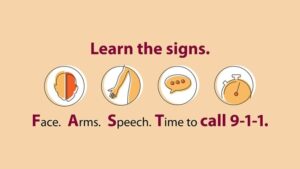Save Your Life or Someone You Care About—Know the Signs of a Stroke
August 2, 2023
The statistics are cautionary. Strokes are the fifth leading cause of death and a leading cause of disability in the United States.
A stroke occurs because a blood vessel that carries oxygen and nutrients to the brain is either blocked by a clot or ruptures. When that happens, part of the brain cannot get the oxygen it needs from the blood, so brain cells die.
By knowing the signs and symptoms of stroke, you can be a superhero, swing into action, and perhaps save a life—maybe even your own. The U.S. Centers for Disease Control (CDC) says countless lives could be saved if you know what to do if you or someone else is having a stroke.
“If you think someone may be having a stroke, act F.A.S.T. and do the following test:
F—Face: Ask the person to smile. Does one side of the face droop?
A—Arms: Ask the person to raise both arms. Does one arm drift downward?
S—Speech: Ask the person to repeat a simple phrase. Is the speech slurred or strange?
T—Time: If you see any of these signs, call 9-1-1 right away.”

The CDC also wants us to keep in mind:
“[Do] note the time when any symptoms first appear. This information helps health care providers determine the best treatment for each person.
Do not drive to the hospital or let someone else drive you. Call 9-1-1 for an ambulance so that medical personnel can begin life-saving treatment on the way to the emergency room.”
“What are the signs of stroke in men and women?
- Sudden numbness or weakness in the face, arm, or leg, especially on one side of the body.
- Sudden confusion, trouble speaking, or difficulty understanding speech.
- Sudden trouble seeing in one or both eyes.
- Sudden trouble walking, dizziness, loss of balance, or lack of coordination.
- Sudden severe headache with no known cause.”
The CDC emphasizes that “during a stroke every minute counts. The stroke treatments that work best are available only if the stroke is recognized and diagnosed within 3 hours of the first symptoms. Stroke patients may not be eligible for these if they don’t arrive at the hospital in time.”
The Chicago Social Security Disability lawyers at Nash Disability Law encourage you to commit these stroke guidelines to memory and share them with your family and friends. Someday they may save a life.


